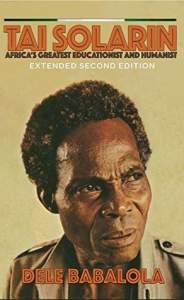
A former student writes a paean to his teacher, a visionary educator who strove to improve conditions at every level in his home country of Nigeria in Tai Solarin: Africa’s Greatest Educationist and Humanist.
When Dele Babalola attended Mayflower School, he was at first concerned that the place was too “bush,” and indeed, living conditions were bare-bones, with a rigorous curriculum and a rule: “obey first, before complaining.” Babalola quickly recognized that at Mayflower, the brainchild of charismatic headmaster and founder Tai Solarin, education was foremost.
Babalola would bond with Solarin when both were reading the works of Nigerian revolutionary author Wole Soyinka. On the day in 1994 when he heard of Solarin’s death, Babalola knew he must write a tribute to this great man who had insisted, against Nigerian custom, on being buried immediately so his body could enrich the soil of the country he loved.
Solarin, born around 1920, volunteered for service in the Royal Air Force in World War II, enabling him to receive higher education in England at Manchester and London Universities, studying History and Geography. He and his English wife Sheila went back to Nigeria, and after working as a college principal he took what money he had and started the Mayflower School, the first non-religious school in the country.
Solarin encouraged extensive reading in English, emphasizing the works of such well-known activists as Gandhi, Thomas Paine, and Martin Luther King. Those who knew the man who called himself “Oga Tasere” (leader who may easily be blown away) recall his humility, and his insistence on helping others before himself. He volunteered his services during the Nigeria-Biafra war, both feeding and educating stricken children. He became a freelance journalist who openly decried his nation’s policies and became well known to authorities, detained in prison on numerous occasions for speaking out. All of this paints the portrait of a laudable, storied, and deeply intelligent man.
Babalola’s well-organized biography, underpinned with commentary by other “ex-Mays,” makes it plain that Solarin was the equal of the revolutionary greats he so admired. Though he eschewed religion, having been disappointed once too often by religious rules and institutions, he himself presented something of a messianic profile. According to the author, Solarin despised waste, practiced self-denial, taught simple crafts, advocated for technical schools, and was well known for his philanthropy and self-sacrifice to the causes he espoused. He risked his life by boldly pointing out the flaws in the oligarchical governance of Nigeria.
Though most certainly of interest to former students of the school who may have known the educator, this biography is a fascinating portrait of a dynamic and complex man. It is not just a story about educational methods, but of a man courageously fighting against a rigid system and charting his own path, and in turn the path of all of his students. In this way, the biography is an inspiring story of perseverance and ultimate success, which is a story that can speak to many readers.
Babalola has obvious reverence for his subject, but the biography importantly retains its objectivity, containing both factual history and anecdotal information from those on the inside. Once having read this gripping account, complete with letters from Solarin, some of which read like manifestos, one will doubtless agree with the author that the future of Nigeria lies with ex-Mays and others like them who have the courage to follow in Oga’s footsteps.
Book Links
STAR RATING
Design
Content
Editing
Get an Editorial Review | Get Amazon Sales & Reviews | Get Edited | Get Beta Readers | Enter the SPR Book Awards | Other Marketing Services























Leave A Comment